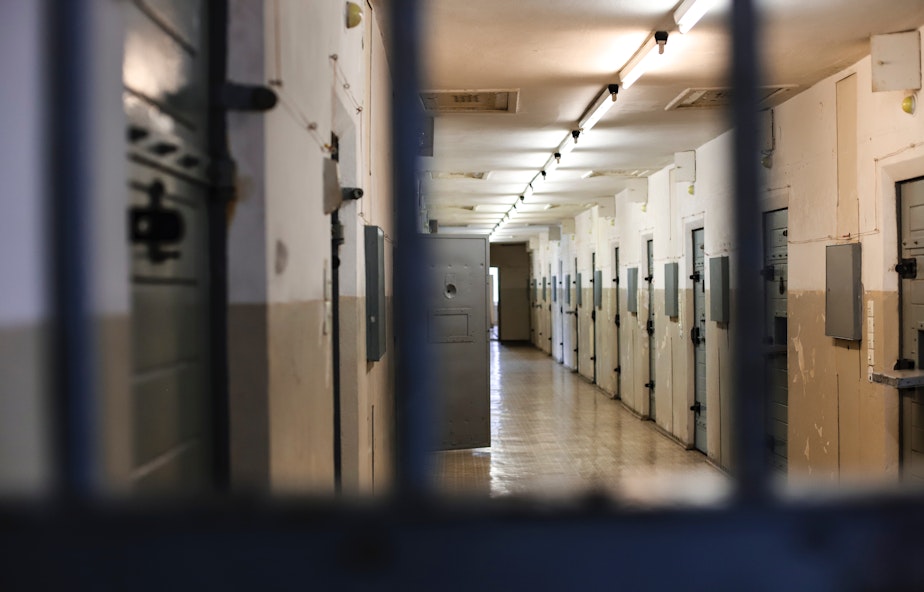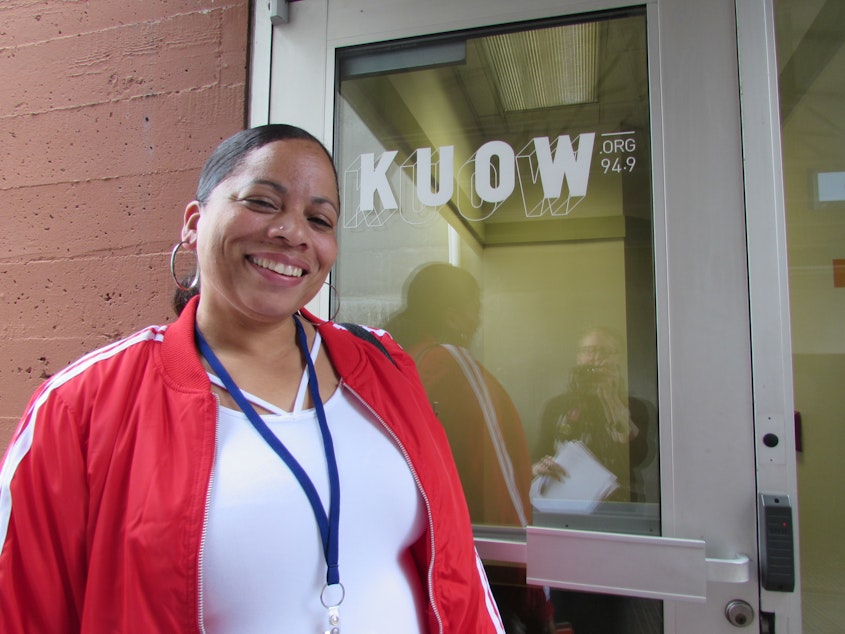20 years behind bars, now helping youth stay out of prison

In 1999, Andrea Altheimer of Seattle was sentenced to nearly 40 years in prison. She was convicted for shooting and wounding her ex-boyfriend after she found him with another woman.
But this year the King County Prosecutor’s office concluded that her sentence was excessive, and there were grounds to decrease it by half. She was released in March from the Washington Corrections Center for Women in Gig Harbor.
We started our conversation with Altheimer by playing her a video of her family, friends, and pastors at the courthouse -- gathering and holding hands -- after her sentence was reduced.
What's it like to hear that?
It's so surreal. I've imagined this day but to actually see it happen it is so heartwarming. It's so surreal. It's great.
You are back now with your family and your community after 20 years away. What did you want want to do first?
I wanted to spend time with my children, just reuniting with them. And I got to do that. It was great. They actually picked me up from prison. So when I left to go to prison my kids were 9, 12, and 15. And so for my three kids to actually pick me up from prison is pretty amazing.
Sponsored
What was it like to see them pulling up in the car?
It was like they are no longer children. It was like these three adults, you know? And it was like now I can't even put it into words. It was it was amazing. It was really amazing.
If I can take you back a few years, you filed a clemency petition while you were in the corrections center and you and others who know you talked about the ways your life had changed since you entered prison. How did your life change?
Well I can say that when I entered prison there wasn't a roadmap how to do prison. It was like you just kind of show up and you figure it out. So I saw my first counselor and she just gave me some suggestions. She says there were self-esteem, woman's worth and domestic violence, alternative to violence. And she says I think that these classes would be beneficial to you. Stress and anger management. And so I sought those classes and they changed my life.

Sponsored
There were also groups that you joined as well. Can you tell me a bit about those?
So the groups were the mindful meditation. That was one of the groups that with the Freedom Project I joined that. The alternative to violence group. I joined them. What made me really join all these groups is I wanted to better understand how did I come to that point on that morning I committed my crime. And how was it that I didn't consider my children? I didn't consider my job, my family. There was nothing that came into play that stopped me at that moment. And I wanted to better understand that.
In the meantime as you were doing this work with yourself, with others, prosecutors concluded that there were legal grounds to reduce the number of criminal charges that you had faced and they supported your re-sentencing. What was your reaction when you heard that coming from their office?
I was hopeful. I was excited. I was. My whole 20-something years in prison there had only been six women that were granted clemency. So there's not a lot of hope within that system. And we didn't see a lot of movement especially with the long term offenders. So going before the clemency process it was scary and you hoped for the best but you really didn't expect it. So when the King County Prosecutor's Office said that they would support me once I reach that 20 year mark and they had seen some of the work that I had done in prison, and of course they read the petition and so they saw the certificates and all of that. I was excited and hopeful as it gave the women in prison hope as well.
There were two victims of your crime: One of them, your former boyfriend, forgave you. The other, a woman who had been a close friend, said she did not forgive you. She opposed your release and her opposition is one of the reasons you were denied an earlier clemency. What would you say to her now?
Sponsored
Well like I said at my clemency hearing and at my re-sentencing that all the good things that I have done while inside of prison I attribute it to them, to my victims. Because I know what it is like to be a victim. And so being on the other side of that, the victimizer, was like I wanted to do everything that I could to give penitence onto them because there's a no contact order. It wasn't like that I could call them say, ‘I'm sorry’ or that they can actually see the work that I was doing in prison, but the work that I did was like, if I can become better than it is attributed to them for the safety or the security that I have taken from them. They deserve that.
You told the court you plan to keep working with people affected by the criminal justice system. How are you going to do that?
I'm doing it. I'm actually working with Community Passageways and we're working with youth. Those youth that have gotten in trouble and we help mentor them, we do healing circles and they help them with diversion in the court system.
And what do you really want them to know about themselves?
That they're... I like to build up their self-worth and know that the trouble that they have gotten into does not have to define them. But that dealing with the underlying issues in their lives, if they deal with that then they would go much further in life because that was my stumbling block, not dealing with my issues rather stuffing them.
Sponsored
Andrea, is there anything else that you wish I had asked you about or something you want me to know?
What I would like you to know is that there's a lot of Andreas that are within the prison system today. There's a lot of women there that have been there a long time and they - it makes me want to cry. They have transformed their lives and they haven't been given another opportunity and they're just being warehoused. And I think that women should be looked at in the same lens that men are looked at because men are gaining release at a higher rate than women are, like I mentioned earlier. There's only been six women in 21 years. And there's a lot of women that have transformed their lives and they're just existing within this prison system. So they should bring back the parole board or something. Some type of review board to look at these women because on the inside I felt and they feel today like we're just a brick on a wall and no one's paying attention.
Andrea Altheimer recently released from the Washington Corrections Center for Women in Gig Harbor. Andrea thank you for talking with me.
Thank you.






